Examples to explain variable types in java
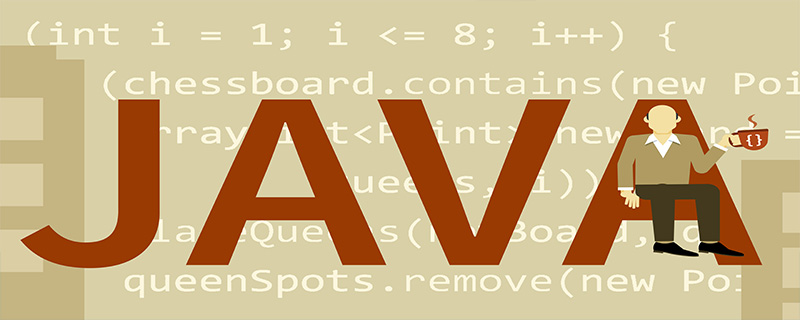
First of all, there are three types of variables supported by the Java language, namely:
Class variables: variables independent of methods, modified with static.
Instance variables: variables independent of methods, but without static modification.
Local variables: variables in class methods.
Example:
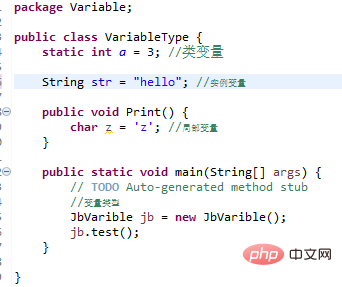
(Video tutorial recommendation: java video)
Local variables
Local variables are declared in methods, constructors, or statement blocks;
Local variables are created when methods, constructors, or statement blocks are executed. When they are executed, the variables will be destroyed;
Access modifiers cannot be used for local variables;
Local variables are only visible in the method, constructor or statement block in which they are declared;
Local Variables are allocated on the stack.
Local variables have no default value, so after a local variable is declared, it must be initialized before it can be used.
Example:
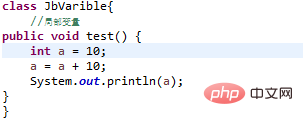


Instance variables
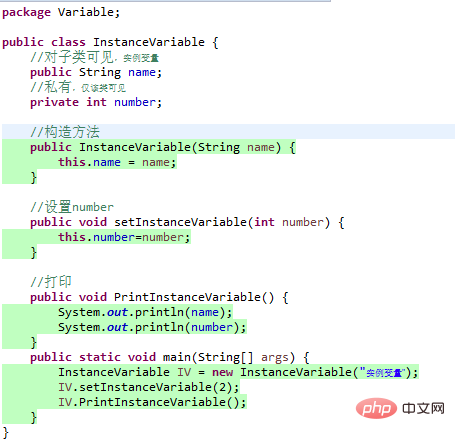

Class variable
Class variables are also called static variables. They are declared with the static keyword in the class, but must be outside the method. No matter how many objects a class creates, the class only has one copy of the class variable. Static variables are rarely used except when declared as constants. Constants refer to variables declared as public/private, final and static types. Constants cannot be changed after initialization. Static variables are stored in the static storage area. Often declared as constants, variables are rarely declared using static alone. Static variables are created when they are accessed for the first time and are destroyed when the program ends. Have similar visibility to instance variables. But in order to be visible to users of the class, most static variables are declared as public types. Default values are similar to instance variables. The default value of numeric variables is 0, the default value of Boolean variables is false, and the default value of reference types is null. The value of a variable can be specified when declaring it or in the constructor. In addition, static variables can also be initialized in static statement blocks. Static variables can be accessed through: ClassName.VariableName. When a class variable is declared as a public static final type, it is generally recommended to use uppercase letters for the class variable name. If the static variable is not of public or final type, its naming method is consistent with the naming method of instance variables and local variables.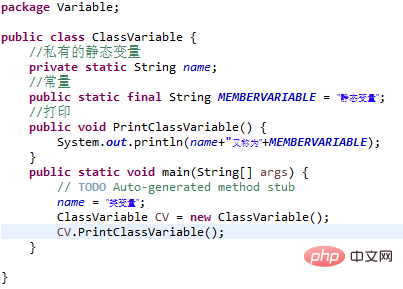

Recommended tutorial: Getting started with java development
The above is the detailed content of Examples to explain variable types in java. For more information, please follow other related articles on the PHP Chinese website!

Hot AI Tools

Undresser.AI Undress
AI-powered app for creating realistic nude photos

AI Clothes Remover
Online AI tool for removing clothes from photos.

Undress AI Tool
Undress images for free

Clothoff.io
AI clothes remover

AI Hentai Generator
Generate AI Hentai for free.

Hot Article

Hot Tools

Notepad++7.3.1
Easy-to-use and free code editor

SublimeText3 Chinese version
Chinese version, very easy to use

Zend Studio 13.0.1
Powerful PHP integrated development environment

Dreamweaver CS6
Visual web development tools

SublimeText3 Mac version
God-level code editing software (SublimeText3)

Hot Topics
 1379
1379
 52
52
 Perfect Number in Java
Aug 30, 2024 pm 04:28 PM
Perfect Number in Java
Aug 30, 2024 pm 04:28 PM
Guide to Perfect Number in Java. Here we discuss the Definition, How to check Perfect number in Java?, examples with code implementation.
 Random Number Generator in Java
Aug 30, 2024 pm 04:27 PM
Random Number Generator in Java
Aug 30, 2024 pm 04:27 PM
Guide to Random Number Generator in Java. Here we discuss Functions in Java with examples and two different Generators with ther examples.
 Weka in Java
Aug 30, 2024 pm 04:28 PM
Weka in Java
Aug 30, 2024 pm 04:28 PM
Guide to Weka in Java. Here we discuss the Introduction, how to use weka java, the type of platform, and advantages with examples.
 Smith Number in Java
Aug 30, 2024 pm 04:28 PM
Smith Number in Java
Aug 30, 2024 pm 04:28 PM
Guide to Smith Number in Java. Here we discuss the Definition, How to check smith number in Java? example with code implementation.
 Java Spring Interview Questions
Aug 30, 2024 pm 04:29 PM
Java Spring Interview Questions
Aug 30, 2024 pm 04:29 PM
In this article, we have kept the most asked Java Spring Interview Questions with their detailed answers. So that you can crack the interview.
 Break or return from Java 8 stream forEach?
Feb 07, 2025 pm 12:09 PM
Break or return from Java 8 stream forEach?
Feb 07, 2025 pm 12:09 PM
Java 8 introduces the Stream API, providing a powerful and expressive way to process data collections. However, a common question when using Stream is: How to break or return from a forEach operation? Traditional loops allow for early interruption or return, but Stream's forEach method does not directly support this method. This article will explain the reasons and explore alternative methods for implementing premature termination in Stream processing systems. Further reading: Java Stream API improvements Understand Stream forEach The forEach method is a terminal operation that performs one operation on each element in the Stream. Its design intention is
 TimeStamp to Date in Java
Aug 30, 2024 pm 04:28 PM
TimeStamp to Date in Java
Aug 30, 2024 pm 04:28 PM
Guide to TimeStamp to Date in Java. Here we also discuss the introduction and how to convert timestamp to date in java along with examples.
 Java Program to Find the Volume of Capsule
Feb 07, 2025 am 11:37 AM
Java Program to Find the Volume of Capsule
Feb 07, 2025 am 11:37 AM
Capsules are three-dimensional geometric figures, composed of a cylinder and a hemisphere at both ends. The volume of the capsule can be calculated by adding the volume of the cylinder and the volume of the hemisphere at both ends. This tutorial will discuss how to calculate the volume of a given capsule in Java using different methods. Capsule volume formula The formula for capsule volume is as follows: Capsule volume = Cylindrical volume Volume Two hemisphere volume in, r: The radius of the hemisphere. h: The height of the cylinder (excluding the hemisphere). Example 1 enter Radius = 5 units Height = 10 units Output Volume = 1570.8 cubic units explain Calculate volume using formula: Volume = π × r2 × h (4




